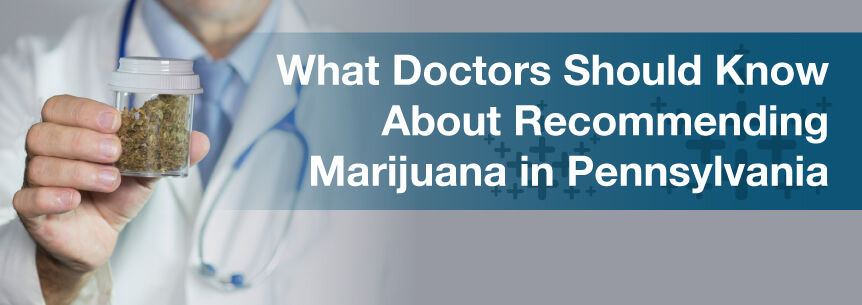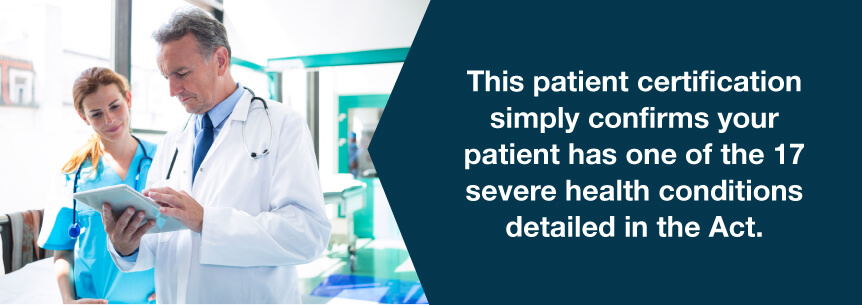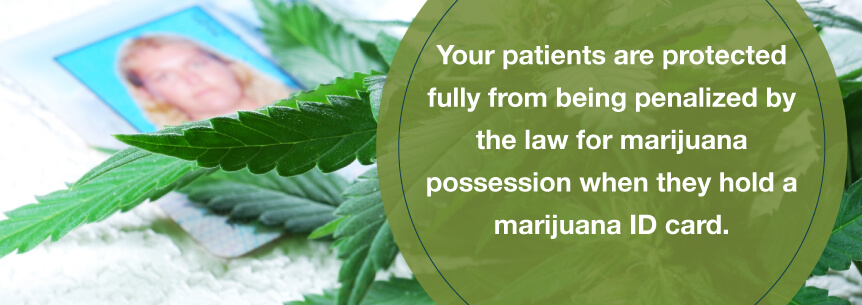
The medical cannabis program in Pennsylvania is underway, and its ultimate success depends on the quick involvement of doctors. Currently, more than 350 physicians are approved by the state of Pennsylvania to certify patients for the medical marijuana program. Another 300 or so more are registered to participate in the required four-hour training course needed for physician certification.
However, there’s a call for more physicians from all medical specialties to register on the Pennsylvania Department of Health registry and take the required course — as the patient demand is there. So far, more than 16,000 Pennsylvania residents have registered for the medical marijuana program, and 3,300 have been certified to receive medical cannabis.
This guide offers you, as a physician, information on what you need to know about recommending marijuana in Pennsylvania. It also provides you with the steps you need to take to sign up for the Keystone state’s medical marijuana program to recommend and certify patients for cannabis.
Under the Pennsylvania Medical Marijuana Act — Act 16 of 2016, a Pennsylvania resident with a serious health condition can obtain weed with a valid certification and is limited by Pennsylvania statute to the ensuing cannabis forms:
Per SB 3, smoking is not considered an approved delivery method.
The Department of Health (DOH) in Pennsylvania is currently putting the state’s Medical Marijuana Program into action. Once the program is fully implemented, it will offer patients with serious medical conditions access to medical weed through an effective and safe delivery method that balances the patient’s need for access to the most recent treatments with patient safety and care.

Things you should know about certifying a patient for medical marijuana in Pennsylvania include:
The Senate approved the Senate Bill 3 (SB 3) 42-7 on April 12, 2016, and the House approved it 149-46 on April 13, 2016. Pennsylvania Governor TomWolf signed it into law on April 17, 2016. Senate Bill 3 effectively eliminates all state-level criminal penalties as far as marijuana’s possession, use, and cultivation by patients possessing a physician-signed recommendation that states cannabis “may mitigate” their serious medical condition.
To further avoid putting doctors at possible risk and to increase physician participation in the medical marijuana program, state medical cannabis laws do not require doctors to provide specific dosages, methods of administration or strains. Physicians simply affirm a patient has a qualifying condition and that the doctor believes the patient may receive a benefit from cannabis.
The incentive for doctors to have the opportunity to recommend medical weed is to have the ability to offer outstanding patient care. Also, patients request it. Many studies show medical pot helps patients dealing with severe health conditions by easing their pain and enhancing their quality of life.
State-specific laws vary for healthcare professionals. To provide patients with certification for the state’s medical cannabis program, the healthcare professional must follow specific steps. Here’s a doctor’s guide to medical marijuana in PA.
As a doctor wanting to recommend medical marijuana in PA, you must follow the following steps.
1. Apply for Inclusion in the PA Department of Health Registry
To provide certification, you must register with the Department of Health (DOH) You’ll have to create a profile in the DOH registry. Supply your Department of State validated current and valid medical license information. You’ll also need to confirm the patient does indeed have a medical condition that qualifies either by reviewing their present medical records or past treatments for their qualifying diagnosis or, if qualified to do so, diagnosing the patient to determine if medical marijuana therapy will benefit the patient’s present health condition.
The DOH website lists the registered and approved physicians.
2. Complete the Continuing Medical Education
You are required to finish the CME 4-hour training from an approved provider during your registration process. Your CMEs will count towards your licensure requirement.

Five approved PA training providers for you to obtain your four-hour course include:
The estimated cost of this 4-hour training course is approximately $500.
3. Receive DOH Review and Approval to Issue Medical Marijuana Certifications to Patients
Your registration is subject to a yearly review and disciplinary action, or the state can revoke it if your license expires.
4. Establish Continuous Care and Need
As a patient’s certifying doctor, you must conclude the patient will receive palliative or therapeutic benefit from using medical cannabis. Furthermore, you must establish and maintain an ongoing patient/doctor relationship. The patient must stay under your continuing care for their terminal illness or severe health condition. As their certifying doctor, you must provide the DOH and the patient copies of the certification and keep copies of the certification in the medical records of the patient.
You also have the absolute responsibility to inform the Department of Health if the patient doesn’t have the severe health condition they were originally certified for anymore. You also must notify them if the medical pot will no longer be palliative or therapeutic or if the patient is now deceased.
As a DOH-approved physician, you can issue a patient certification. Here’s what you need to know about how to recommend medical marijuana in PA.
1. Confirm Your Patient Has a Qualifying Serious Medical Condition
This patient certification simply confirms your patient has one of the 17 severe health conditions detailed in the Act (see below). It also confirms medical cannabis will benefit your patients. Your patients can’t participate in the PA Medical Cannabis Program if they don’t have this certification.

You must diagnose and document your patient as having a “serious medical condition.” The Act defines the 17 following as a serious medical condition:
2. Review the Prescription Drug Monitoring Program
Before you issue a certification, you need to confer with the Prescription Drug Monitoring Program to verify the patient’s controlled substance history. Depending on this review, your patient might or might not be a potential candidate for receiving a medical cannabis certification.
Patients: If your patients wish to become a part of the Medical Cannabis Program, they need to follow these steps:
Caregivers: Caregivers wanting to become a part of the Medical Cannabis Program also have steps to follow:
Your patients can obtain their medical cannabis identification card through you as a registered physician with the Department of Health when they complete and submit an application approved by the DOH. The DOH makes it as simple as possible for your patients to apply for its cards and is currently reviewing how to offer online applications through its website.
Your patients’ PA cannabis card shows they’re fully registered with the DOH and approved to purchase medical pot in Pennsylvania. They are allowed to buy an appropriate amount of cannabis with this credential to treat any of the medical health conditions approved.

Your patients are protected fully from being penalized by the law for marijuana possession when they hold a marijuana ID card. If they’re using or in possession of cannabis and don’t have more than what the law allows, police won’t:
When your patient applies through the DOH for their marijuana card, they may designate one to two caregivers. Caregivers can help up to five patients. Before your patient obtains cannabis, their caregiver needs to also apply for a cannabis card.
Only the caregiver or the patient with the DOH-issued cannabis card may buy medical pot at an approved dispensary. The DOH authorizes up to 150 state-wide dispensaries.
Here are the rules:
6. You Can’t Advertise Your Ability to Provide Medical Cannabis Certifications
Again, the success of the medical marijuana program in Pennsylvania depends in part on physician involvement. In New Jersey and New York, there’s a tight restriction on patient access to medical cannabis and its medications since there are only a few physicians participating. In New York, around 900 of the 96,000 doctors have signed up.
Since the PA medical cannabis program is relatively new, you’ll want to visit our MarijuanaDoctors.com website often to stay up-to-date on the most updated laws about the medical marijuana program in Pennsylvania.
Marijuana Doctors has organized an index of information for PA medical cannabis so you can use it as a reference of the guidelines and laws in PA as well as the program details regarding the use of medical pot in Pennsylvania. Be sure to check out our other doctor resources and join our newsletter.
No Information on MarijuanaDoctors.Com should be used to diagnose, treat, prevent or cure any disease or condition. You can view our Full Disclaimer here.